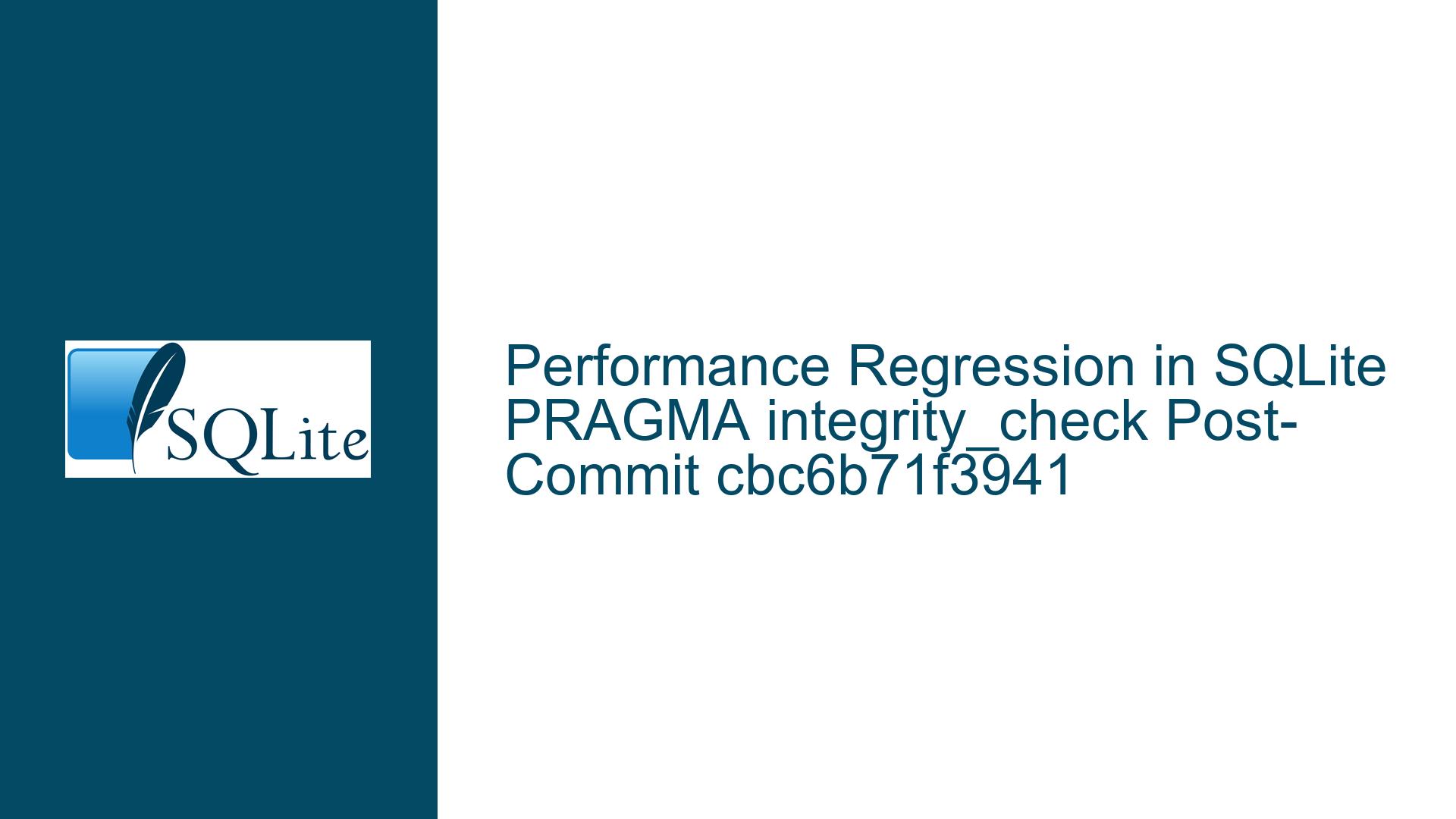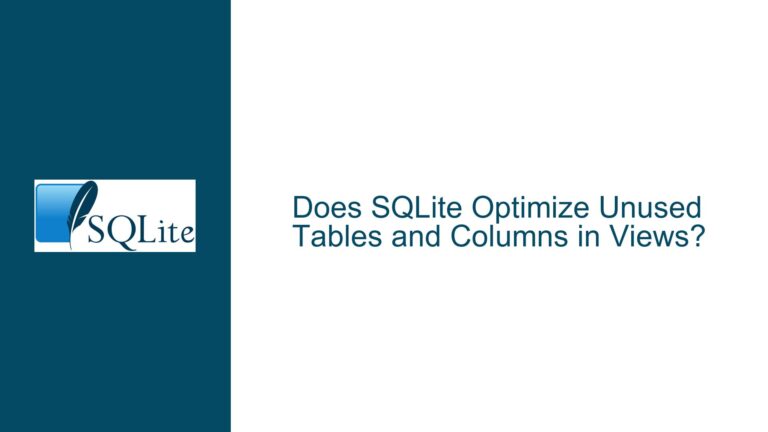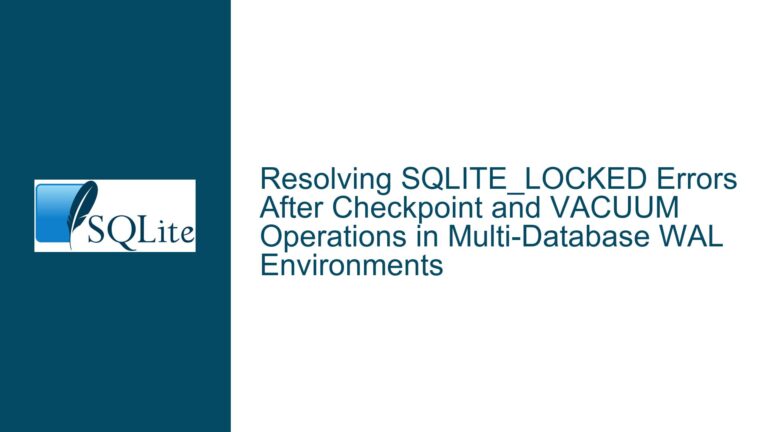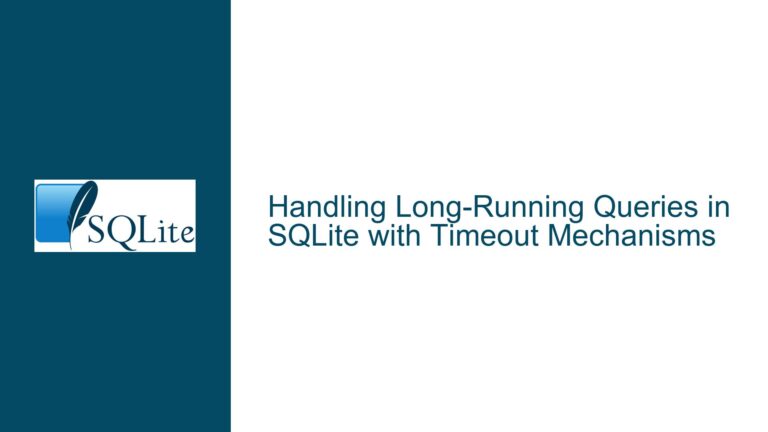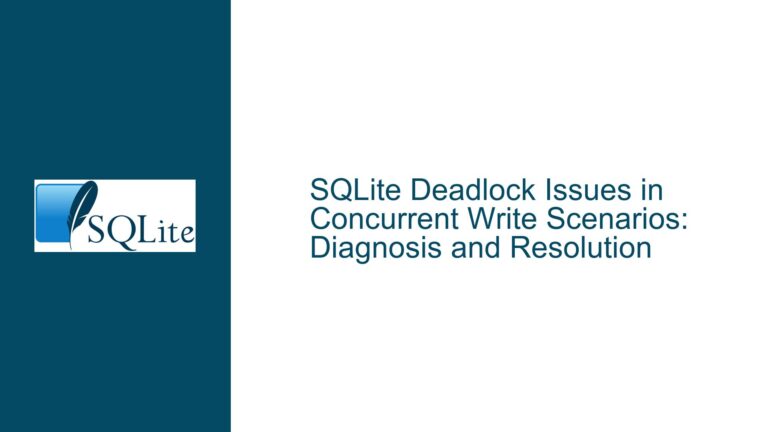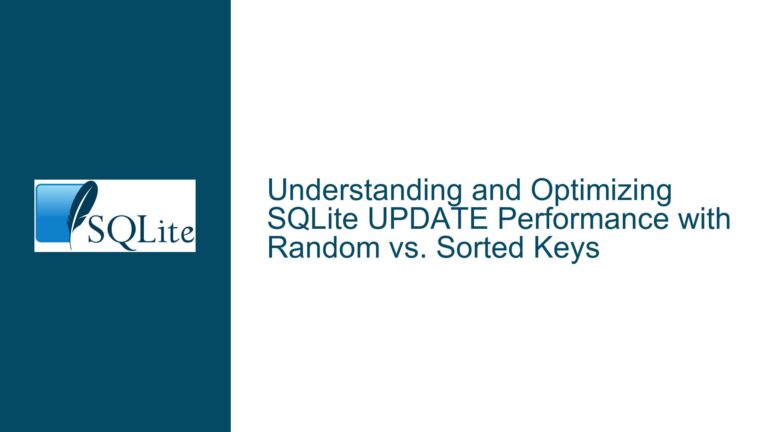Performance Regression in SQLite PRAGMA integrity_check Post-Commit cbc6b71f3941
Understanding the Performance Regression in PRAGMA integrity_check
The performance degradation observed in PRAGMA integrity_check and PRAGMA quick_check after the integration of commit cbc6b71f394124a686fd99d00a78e95dd (also referenced as SQLite’s internal identifier 251a7590ff4f65f59) stems from structural changes to how SQLite’s btree layer iterates over cell pointer arrays during database validation. This commit, though over eight years old, introduced modifications to the cell pointer traversal logic in the btree.c module, specifically altering the loop that processes cell pointers during page verification. The primary purpose of PRAGMA integrity_check is to validate the consistency of the database’s btree structures, freelist management, and inter-page linkages. When this process slows down, it directly impacts maintenance workflows, particularly for large databases where thorough validation is critical.
At the heart of the issue is the cell pointer array iteration logic in SQLite’s btree implementation. Each SQLite database page contains an array of cell pointers that map to the offsets of individual cells (database records or index entries) within the page. During an integrity check, SQLite must verify that all cells are correctly formatted, reference valid data, and adhere to structural invariants. The commit in question revised the loop structure responsible for iterating over these cell pointers, introducing additional validation steps or altering the iteration order. While these changes were likely intended to improve correctness or edge-case handling, they inadvertently increased the computational complexity of the validation process. For example, a previously linear scan of cell pointers may have been replaced with a nested loop or additional conditional checks that degrade performance on pages with many cells.
The problem is exacerbated in databases with specific characteristics: tables or indices with high fan-out (many cells per page), fragmented pages requiring freelist traversal, or complex overflow chain structures. These scenarios force the modified iteration logic to perform redundant work, such as rechecking pointers or traversing auxiliary data structures multiple times. The result is a measurable increase in wall-clock time for PRAGMA integrity_check, particularly in databases that were previously validated efficiently under older SQLite versions.
Root Causes of Post-Commit Integrity Check Efficiency Decline
The efficiency decline in PRAGMA integrity_check can be traced to three interrelated factors stemming from the changes in commit cbc6b71f394124a686fd99d00a78e95dd:
Modified Cell Pointer Traversal Algorithm:
The commit altered the loop structure in thecheckPtrmapfunction (or related btree validation routines) responsible for iterating over cell pointers. Prior implementations may have used a simple forward loop to process each cell pointer sequentially. The revised logic introduced conditional branches or secondary validations within the loop body, increasing the per-iteration overhead. For instance, a check for overlapping cells or pointer validity might have been added, requiring additional computations for each cell. In worst-case scenarios, this could transform an O(n) operation into O(n log n) or O(n²) due to nested validations.Increased Page-Level Validation Strictness:
To address specific edge cases (e.g., corruption patterns involving malformed cell offsets), the commit likely expanded the scope of checks performed on each cell. This includes verifying that cell pointers do not reference locations outside the page boundaries, ensuring cells do not overlap, or validating overflow page linkages more rigorously. While these checks improve robustness, they add computational steps that cumulatively slow down the integrity check process. For example, validating overflow chains now requires following each chain to its end, which was previously deemed unnecessary for “quick” checks.Memory Access Pattern Disruption:
Modern CPUs rely heavily on cache efficiency for performance. The original cell pointer iteration may have accessed memory in a predictable, linear fashion, allowing hardware prefetching to minimize latency. The revised logic might disrupt this pattern by introducing non-sequential accesses (e.g., jumping to overflow pages mid-iteration) or intermixing validation steps that pollute the cache with unrelated data. This results in higher cache miss rates and increased memory latency, further degrading performance.
Diagnosing and Resolving Integrity Check Performance Degradation
To address the performance regression in PRAGMA integrity_check, follow these steps:
Step 1: Reproduce the Regression
Begin by benchmarking PRAGMA integrity_check execution times on the same database file across SQLite versions before and after commit cbc6b71f394124a686fd99d00a78e95dd. Use the SQLite shell’s .timer command to measure elapsed time. For example:
sqlite3 old_version.db ".timer on" "PRAGMA integrity_check;"
sqlite3 new_version.db ".timer on" "PRAGMA integrity_check;"
Consistently observe a statistically significant increase in execution time with the post-commit version. Document the delta for reference.
Step 2: Profile the Integrity Check Process
Compile SQLite with profiling enabled (-pg for gcc) and run PRAGMA integrity_check under a profiler like gprof or perf. Focus on functions related to btree validation, such as checkTreePage, checkList, or verifyCell. Identify hotspots where the post-commit version spends disproportionately more time. For example, if verifyCell now accounts for 40% of CPU time versus 15% previously, this indicates expanded cell-level checks.
Step 3: Analyze Btree Validation Logic Changes
Review the diff for commit cbc6b71f394124a686fd99d00a78e95dd, paying attention to loops that process cell pointers. Look for added conditionals, nested loops, or function calls within critical paths. For instance, if the commit added a secondary loop to validate overflow chains during cell iteration, this would explain the slowdown. Consider reverting these changes locally (if permissible) and re-benchmarking to confirm causality.
Step 4: Optimize Validation Workflow
If reverting the commit is not feasible, mitigate the performance impact by:
- Using
PRAGMA quick_checkinstead ofintegrity_checkwhere full validation is unnecessary. - Partitioning large databases into smaller attached databases to parallelize checks.
- Scheduling integrity checks during off-peak hours or using incremental
PRAGMA incremental_vacuumto reduce fragmentation.
Step 5: Engage SQLite Maintainers
If profiling confirms the regression stems from the commit’s changes, file a detailed issue on SQLite’s GitHub repository or mailing list. Include benchmark data, profiling results, and a minimal database file that reproduces the slowdown. Propose alternative validation strategies, such as optional fast-path checks for common cases or memoization of repeated validations.
By systematically isolating the cause and applying targeted optimizations, users can restore the efficiency of database validation workflows while retaining the robustness improvements introduced by the contentious commit.
